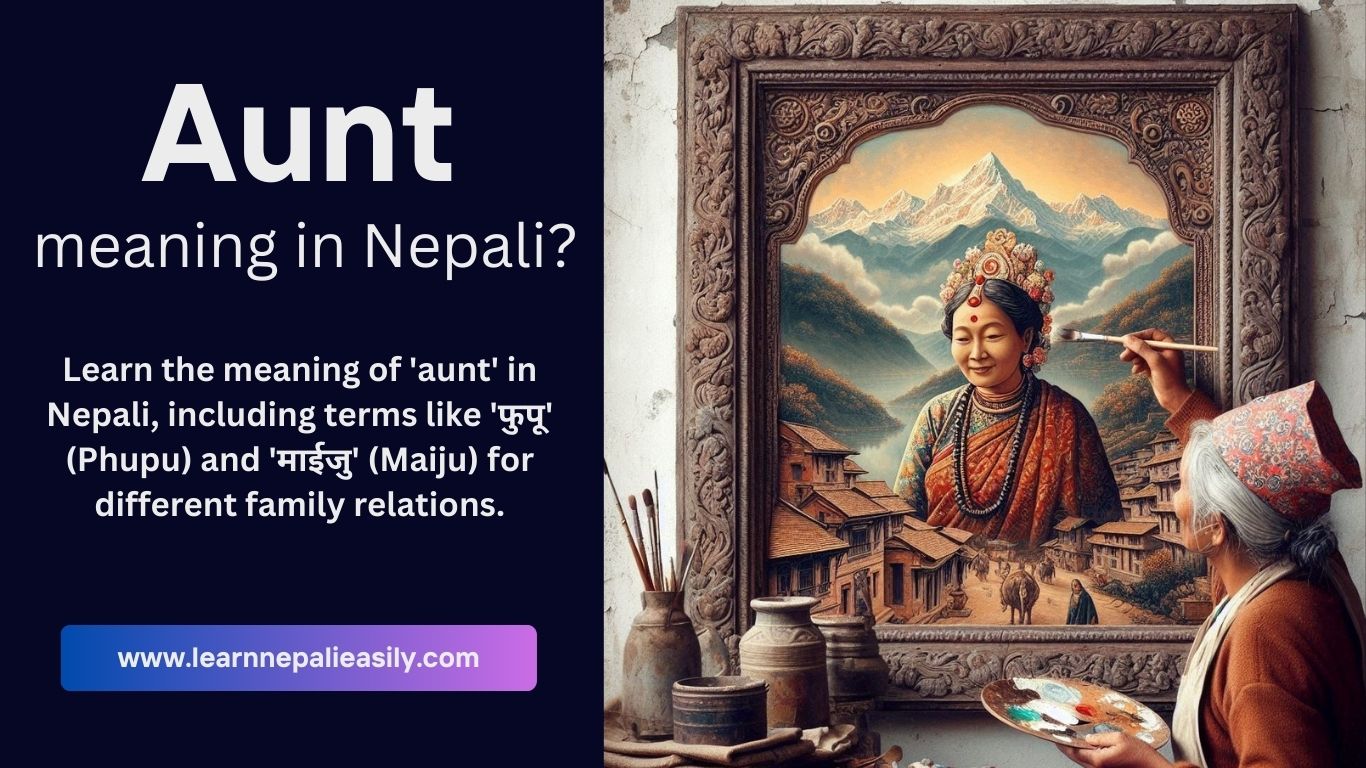In Nepali, family relationships are deeply cherished, and each relative has a distinct term of address. The word “aunt” in English refers to several familial relationships, such as the sister of one’s mother or father or the wife of one’s uncle. Nepali culture has specific words for different types of aunts, depending on whether they are from the maternal or paternal side. Understanding these distinctions will help you communicate effectively and respectfully in Nepali-speaking environments.
In this post, we’ll explore the Nepali terms for aunt, how they are used in various contexts, and the cultural importance of these relationships.
What is the Meaning of “Aunt” in Nepali?
There are different words for “aunt” in Nepali, depending on the family relation:
- “फुपू” (Phupu): Father’s sister
- “ठुली आमा” (Thuli Aama): Father’s elder brother’s wife
- “काकी” (Kaki): Father’s younger brother’s wife
- “माईजु” (Maiju): Mother’s brother’s wife
Each term specifies the exact relationship, making it clear which aunt is being referred to in the family.
Different Nepali Terms for Aunt and Their Usage
Nepali differentiates between aunts based on their relationship to the speaker’s parents. Below are examples showing how each type of aunt is referred to in common Nepali sentences.
- Father’s Sister – फुपू (Phupu)
Sentence: “मेरो फुपू सधैं मलाई भेट्न आउनुहुन्छ।” (Mero fupu sadhai malai bhetna aunuhuncha.)
Translation: “My aunt always comes to visit me.”
The word “फुपू” (Phupu) is used specifically for the father’s sister, and it reflects the closeness of the relationship.
- Father’s Elder Brother’s Wife – ठुली आमा (Thuli Amai)
Sentence: “ठुली आमाको हातको खाना मिठो हुन्छ।” (Thuli aamako haatko khana mitho huncha.)
Translation: “My aunt cooks delicious food.”
Here, “ठुली आमा” (Thuli Amai) is the respectful term for the elder brother’s wife of one’s father.
- Mother’s brother’s wife – माईजु (Maiju)
Sentence: “मेरो माईजु मलाई धेरै माया गर्नुहुन्छ।” (Mero maiju malai dherai maya garnuhuncha.)
Translation: “My aunt loves me very much.”
In this sentence, “माईजु” (Maiju) is used to refer to the speaker’s mother’s brother’s wife.
Cultural Significance of Aunt in Nepali Families
In Nepali families, aunts hold a significant role, often stepping in to help with childcare, guidance, and family support. Whether it is the father’s sister (Phupu), काकी (Kaki) or माईजु (Maiju), these women are highly respected and treated as important members of the family.
Nepali families place great importance on respect for elders, including aunts, who are often involved in family decisions and celebrations. Aunts also serve as secondary mother figures, providing love and guidance to their nieces and nephews.
Common Nepali Phrases Involving “Aunt”
Here are some useful Nepali phrases involving the term “aunt”:
“फुपू, तपाईं कस्तो हुनुहुन्छ?” (Fupu, tapai kasto hunuhuncha?)
Translation: “Aunt, how are you?”
“माईजु, हामीलाई भेट्न कहिले आउनुहुन्छ?” (Maiju, hamilai bhetna kahile aunuhuncha?)
Translation: “Aunt, when will you visit us?”
“ठुली आमाको हातको खाना सधैं मिठो हुन्छ।” (Thuli aamako haatko khana sadhai mito huncha.)
Translation: “Aunt always makes delicious food.”
Conclusion
Understanding the Nepali words for “aunt,” such as “फुपू” (Phupu) for the father’s sister, is key to engaging with the language and culture. Each term carries its own significance and reflects the special role aunts play in Nepali families. Learning how to use these terms correctly will deepen your connection to Nepali-speaking communities and enhance your understanding of familial relationships.

